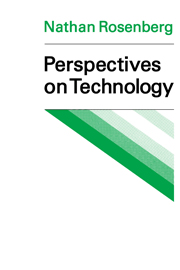Book contents
- Frontmatter
- Contents
- Acknowledgments
- Introduction
- Part 1 Some origins of American technology
- Part 2 The generation of new technologies
- 4 Problems in the economist's conceptualization of technological innovation
- 5 Neglected dimensions in the analysis of economic change
- 6 The direction of technological change: inducement mechanisms and focusing devices
- 7 Karl Marx on the economic role of science
- Part 3 Diffusion and adaptation of technology
- Part 4 Natural resources, environment and the growth of knowledge
- Epilogue
- Notes
- Index
7 - Karl Marx on the economic role of science
Published online by Cambridge University Press: 09 January 2010
- Frontmatter
- Contents
- Acknowledgments
- Introduction
- Part 1 Some origins of American technology
- Part 2 The generation of new technologies
- 4 Problems in the economist's conceptualization of technological innovation
- 5 Neglected dimensions in the analysis of economic change
- 6 The direction of technological change: inducement mechanisms and focusing devices
- 7 Karl Marx on the economic role of science
- Part 3 Diffusion and adaptation of technology
- Part 4 Natural resources, environment and the growth of knowledge
- Epilogue
- Notes
- Index
Summary
It is not the articles made, but how they are made, and by what instruments, that enables us to distinguish different economical epochs.
[Marx 1906, p. 200]The purpose of this paper is to examine certain aspects of Marx's treatment of rising resource productivity and technological change under capitalism. Many of the most interesting aspects of Marx's treatment of technological change have been ignored, perhaps because of the strong polemical orientation which readers from all shades of the political spectrum seem to bring to their reading of Marx. As a result, much has been written about the impact of the machine upon the worker and his family, the phenomenon of alienation, the relationship between technological change, real wages, employment, etc. At the same time, a great deal of what Marx had to say concerning some 300 years of European capitalist development has received relatively little attention. This applies to his views dealing with the complex interrelations between science, technology, and economic development.
It is a well-known feature of the Marxian analysis of capitalism that Marx views the system as bringing about unprecedented increases in human productivity and in man's mastery over nature. Marx and Engels told their readers, in The Communist Manifesto, that “the bourgeoisie, during its rule of scarce one hundred years, has created more massive and more colossal productive forces than have all preceding generations together.
- Type
- Chapter
- Information
- Perspectives on Technology , pp. 126 - 138Publisher: Cambridge University PressPrint publication year: 1976
- 4
- Cited by



